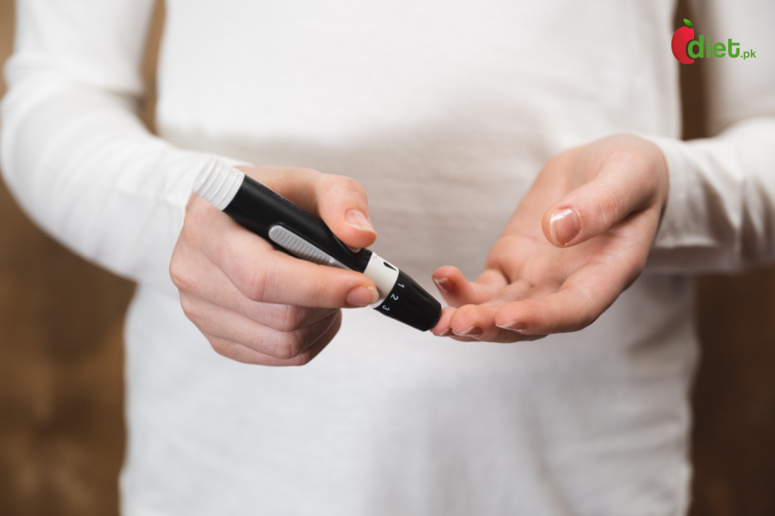How to manage and live with diabetes in Pakistan?
Indulging in sweet treats like Gulab Jamun, Ras Gula, Multani Sohan Halwa, and Sher Khormas may bring momentary pleasure to your taste buds, but be warned overindulgence can have long-lasting consequences. With 1 in 4 adults living with diabetes, Pakistan has the highest diabetes prevalence in the world.
Do you know overeating these sweets can put you at risk of a chronic disease?
Diabetes is one of the most feared yet commonly prevalent diseases in Pakistan. This long-lasting chronic condition affects how the body turns food into energy.
Think of your body as a sugar-converting machine. It transforms food into glucose, which enters your bloodstream and signals your pancreas to release insulin. However, if you have diabetes, your insulin levels are low, causing glucose to build up in your bloodstream and wreak havoc on your health. Diabetes is a ticking time bomb. From heart disease to kidney disease and even vision loss, the consequences of uncontrolled diabetes are far-reaching and devastating.
So, what’s behind this sweet-toothed disaster? Heavily processed carbohydrates, saturated and trans fat, and processed meats are common culprits behind diabetes.
No cure for diabetes has been discovered to date. Although the disease can not be cured, it can be managed by losing weight, making healthy lifestyle changes, and staying active.
But that doesn’t mean you must say goodbye to your favorite treats forever. Instead, enjoy them in moderation and choose healthier options when possible. Your taste buds and your health will thank you!
Diabetes on the Rise
Did you hear about the recent study from the King Edward Medical University?
The number of people with diabetes in Pakistan has doubled in just six years! In 2016, only 12{fb52c90c0a725c92a6f268bbe5fbc39af55a489ace50e341a2347e917a8f1d40} of the population had diabetes, but by 2022, that number had skyrocketed to a staggering 26.7{fb52c90c0a725c92a6f268bbe5fbc39af55a489ace50e341a2347e917a8f1d40}. The researchers think all those delicious Sheer Khormas, Shahi Tukras, Suji Halwas, and Niharis might be to blame! Looks like we might have to cut back on sweets and start taking better care of our health.
Click here to learn about healthy and unhealthy food choices in 2023.
Types of Diabetes
Diabetes has three variants: type 1, type 2, and gestational diabetes.
Type 1 Diabetes
Who says a diabetes diagnosis can hold you back? Not Waseem Akram or Fawad Khan, that’s for sure! Did you know that the legendary cricketer, Waseem Akram, was diagnosed with Type 1 diabetes right at the peak of his career? And our heartthrob, Fawad Khan, is living proof that you can live a successful life with Type 1 diabetes.
Famous Pakistanis with Type 1 diabetes.
Type 1 diabetes is caused by an autoimmune reaction where the body accidentally attacks itself. Sometimes Pancreatic injuries or viral infections can also be to blame. The body simply stops making insulin, and daily injections become necessary. According to a global survey by CDC, type 1 diabetes constitutes 10 percent of the total cases.
Type 2 Diabetes
Are you ready for a diabetes wake-up call? Type 2 diabetes affects most people, and it’s a sneaky one – it can take years to develop. Mostly, children and young adults are diagnosed with this type. Obese people are at a higher risk of contracting type 2 diabetes.
Get ready for a shocker, Pakistan! Did you know that over 40{fb52c90c0a725c92a6f268bbe5fbc39af55a489ace50e341a2347e917a8f1d40} of the population is battling obesity while nearly 27{fb52c90c0a725c92a6f268bbe5fbc39af55a489ace50e341a2347e917a8f1d40} live with diabetes? That’s right; there’s a direct connection between the two.
Don’t let delicious dishes like Siri Paya put your health in jeopardy. Take control and make wise choices now. Remember, food is natural medicine! “Dawai Ilaj Nahi Hai, Khorak Ilaj Hai” – let’s make every bite count!
Also, if consuming healthy chia seeds can help in improving insulin sensitivity greatly.
Healthy eating advice from Dr. Affan Qaiser.
Gestational Diabetes
Did you know that 17.2{fb52c90c0a725c92a6f268bbe5fbc39af55a489ace50e341a2347e917a8f1d40} of pregnant women in Pakistan suffer from Gestational Diabetes, according to a 2017 study conducted by JPMA? Gestational diabetes is a type of diabetes that affects pregnant women specifically. The good news is that it goes away after the baby is born. Symptoms include increased thirst, dry mouth, tiredness, and genital itching. In most cases, diabetes goes away after the baby is born.
Managing Diabetes At Home: Lifestyle Changes for Health and Happiness
While diabetes is currently incurable, it’s not a life sentence! By making lifestyle changes like monitoring blood sugar levels, eating a healthy diet, and exercising regularly, people with diabetes can manage the disease and live full, active lives. Though a cure doesn’t exist yet, taking control of your health can help you keep diabetes from controlling you!
Go for the Greens
 Vegetables are your best friends when it comes to managing diabetes. Leafy greens, vegetables, and broccoli are recommended for optimizing vitamin levels. Brown rice and whole wheat bread can be utilized in moderation.
Vegetables are your best friends when it comes to managing diabetes. Leafy greens, vegetables, and broccoli are recommended for optimizing vitamin levels. Brown rice and whole wheat bread can be utilized in moderation.
| Recommended Fruits for Diabetes | Recommended Vegetables for Diabetes |
| Apples | Spinach or Palak |
| Oranges | Shakarkandi or sweet potato |
| Cherries | Lauki or Zucchini |
| Peaches | Lettuce and Lentils |
Managing portion size is essential for diabetics. Diabetics should eat food in small portions six to eleven times a day. An adult male can take anywhere between 45 to 60 grams of carbs per meal. Women can consume 30 to 45 grams. The first meal should be taken within one hour of waking up, and all the proceeding meals should be taken within a 4-hour gap.
Whole grain chapatis with olive oil, mashed potatoes, and milk are some excellent options for diabetics – only if consumed in the right amount.
Get Exercise
 Do you know there is a strong relationship between obesity and diabetes? There are chances that diabetes can go into remission if the patient loses a substantial amount of weight quickly. Diabetic patients are advised 150 minutes of exercise per day. Walking, running, high-intensity interval training (HIIT), and yoga are recommended to patients.
Do you know there is a strong relationship between obesity and diabetes? There are chances that diabetes can go into remission if the patient loses a substantial amount of weight quickly. Diabetic patients are advised 150 minutes of exercise per day. Walking, running, high-intensity interval training (HIIT), and yoga are recommended to patients.
Caution⚠️: Diabetics should avoid heavy lifting and isometric exercises.
Sleep Well
 If you have diabetes, getting enough sleep is crucial. Diabetics are recommended to optimize sleep as it helps with cravings and fatigue. A minimum of 7 hours of sleep and try sleeping on time. Strong evidence suggests staying up late, and irregular sleep patterns can make diabetes worse.
If you have diabetes, getting enough sleep is crucial. Diabetics are recommended to optimize sleep as it helps with cravings and fatigue. A minimum of 7 hours of sleep and try sleeping on time. Strong evidence suggests staying up late, and irregular sleep patterns can make diabetes worse.
Reduce Stress
 Although stress does not cause diabetes, there is limited evidence that stress hormones stop insulin-producing cells. Simply said, stress hormones worsen insulin resistance.
Although stress does not cause diabetes, there is limited evidence that stress hormones stop insulin-producing cells. Simply said, stress hormones worsen insulin resistance.
Always Remember 🙂
Health is a savings account – the more you invest in it, the more it pays off in the long run.
Diabetes Frequently Asked Questions – FAQs
Will diabetes ever be cured?
Currently, there is no known cure for diabetes, but treatments are available that can help manage the condition.
Will diabetes kill you?
If left unmanaged, diabetes can lead to serious health complications that may be life-threatening, but with proper treatment and management, people with diabetes can live long healthy lives.
How does diabetes affect the kidneys?
Diabetes can damage the kidneys over time, leading to diabetic nephropathy, a type of kidney disease that can progress to kidney failure if left untreated.
When does diabetes affect your eyes?
Diabetes can affect the eyes at any stage, but it is most common in people who have had the condition for a long time. This can lead to various eye problems, including diabetic retinopathy, which can cause vision loss if left untreated.
What does diabetes do to your body?
Diabetes affects the body’s ability to regulate blood sugar levels, leading to various health problems over time, including nerve damage, heart disease, and stroke.
Where does diabetes come from?
Genetic and environmental factors, including lifestyle factors such as diet and physical activity, cause diabetes.
What is diabetes in Urdu?
In Urdu, diabetes is known as “ذیابیطس“.
What are the WHO diabetes criteria?
According to these guidelines, a person is considered to have diabetes if their blood glucose level is equal to or greater than 7.0 mmol/L (126 mg/dL) after fasting (not eating) or if their blood glucose level is equal to or greater than 11.1 mmol/L (200 mg/dL) two hours after drinking a sugary drink.
When was diabetes discovered?
Diabetes has been recognized as a health condition for thousands of years, but it was not until the early 20th century that researchers discovered the role of insulin in regulating blood sugar levels and treating diabetes.
What is diabetes mellitus?
Diabetes mellitus is a chronic health condition that affects the body’s ability to produce or use insulin effectively, leading to high blood sugar levels.
Does diabetes cause hypertension?
Diabetes can contribute to the development of hypertension (high blood pressure) and other cardiovascular complications.
What is diabetes ketoacidosis?
Diabetic ketoacidosis is a severe complication of diabetes that can occur when the body produces high levels of ketones, which can be life-threatening if not treated promptly.

